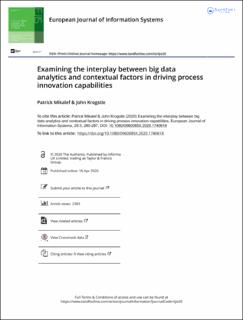Examining the interplay between big data analytics and contextual factors in driving process innovation capabilities
Peer reviewed, Journal article
Published version

Åpne
Permanent lenke
https://hdl.handle.net/11250/2730133Utgivelsesdato
2020Metadata
Vis full innførselSamlinger
Originalversjon
10.1080/0960085X.2020.1740618Sammendrag
The potential of big data analytics in enabling improvements in business processes has urged researchers and practitioners to understand if, and under what combination of conditions, such novel technologies can support the enactment and management of business processes. While there is much discussion around how big data analytics can impact a firm’s incremental and radical process innovation capabilities, we still know very little about what big data analytics resources firms must invest in to drive such outcomes. To explore this topic, we ground this study on a theory-driven conceptualisation of big data analytics based on the resource-based view (RBV) of the firm. Based on this conceptualisation, we examine the fit between the big data analytics resources that underpin the notion, and their interplay with organisational contextual factors in driving a firm’s incremental and radical process innovation capabilities. Survey data from 202 chief information officers and IT managers working in Norwegian firms are analysed by means of fuzzy set qualitative comparative analysis (fsQCA). Results show that under different combinations of contextual factors the significance of big data analytics resources varies, with specific configurations leading to high levels of incremental and radical process innovation capabilities.
